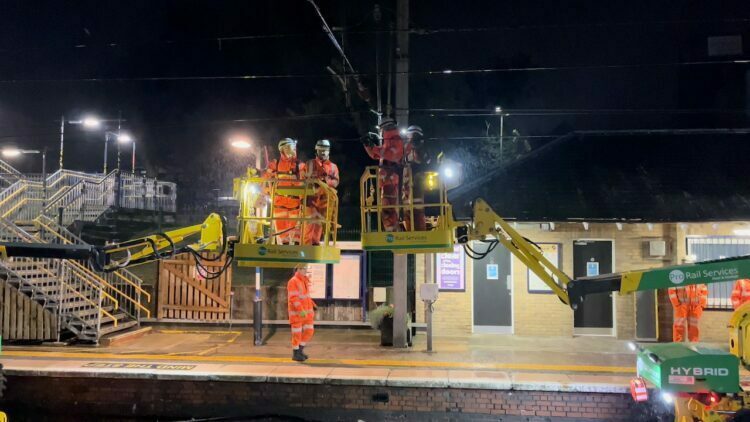Network Rail has undertaken a pilot scheme which saw a zero-emission work site trialled during the renewal of overhead line equipment at Royston station and the immediate surrounding area and marked a first for the Eastern region.
The work took place as part of a pilot by network rail and over the four nights saw engineering carried out using:
- Hybrid rail engineering vehicles only operating in battery mode
- Welfare facilities powered by batteries
- Battery and solar-powered tower lighting throughout the site
The site’s welfare facilities used an 80kw battery pack which also went on to charge rail vehicles after they have been used on the site. Engineers also used battery-powered tools and used recyclable consumables made from materials such as plastics and paper.
Normally, engineering projects such as this would use carbon-intensive diesel-powered generators and equipment to carry out work, however, the first-of-a-kind worksite made use of environmentally friendly methods to complete the project. The changes made to create zero-carbon emissions at the worksite marks a step forward for future engineering projects and will go a long way to supporting Network Rail’s goal of achieving net zero by 2050.
The work carried out at Royston station and surrounding areas will create a more resilient railway whilst bringing smoother and more reliable journeys for passengers.

Hamish Critchell-Ward, Environment Manager at Network Rail, said:
“This is a hugely positive step forward for Network Rail and the rail industry. We’re passionate about finding better, more environmentally friendly ways of carrying out essential maintenance and this is a great example of that.”
“It has been great to work with industry partners on this project. Their support has been invaluable in helping this pilot be as successful as it has been. As we move forward and develop, Network Rail will continue to work closely with its supply chain to deliver environmental benefits during its work.”
“This is just the beginning for us and we’re confident that this way of working will expand further into future engineering work.”
Owen Laws, Electrification & Sustainable Development Project Manager at Network Rail, said:
“This project has been months in the planning and preparation, and I’m delighted that it has finally come to fruition and been so successful.”
“We want this to be a rolling programme of work throughout Network Rail and I’m looking forward to helping other teams deliver engineering work projects in a more sustainable way.”
“Renewing our overhead line equipment at Royston creates a more resilient railway network, improves reliability, and means more reliable journeys for passengers.”





Responses